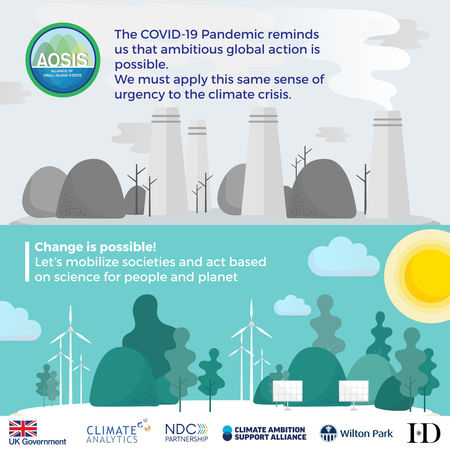Placencia Ambition Forum keeps the drumbeat of climate ambition alive

Hundreds of senior leaders from small island developing states, Least Developed Countries and their development partners met virtually from 20-22 April 2020 for the Placencia Ambition Forum – reports Mairi Dupar of CASA.
Convened by the Alliance of Small Island States (AOSIS) and chaired by Ambassador Lois M Young, the forum’s rallying call was: ‘keep the drumbeat of ambition alive’.
“The climate emergency does not take a break for the coronavirus,” said Patricia Espinosa, UNFCCC Secretary – summing up the urgent need to press forward with climate action, even during the pandemic.
The COVID-19 outbreak and climate change are creating cascades of disaster in small island nations at present. Category 5 Cyclone Harold swept through Vanuatu, Solomon Islands, Fiji and Tonga this month, destroying lives and property. Communities were forced to abandon social distancing measures they had taken in response to coronavirus, in order to evacuate, shelter and save lives from the cyclone’s more immediate threat. Disruption caused by the cyclone means that more people may now be exposed to the virus.
However, in the long-term, climate change is humanity’s “greatest emergency”, said UNFCCC Executive Secretary Patricia Espinosa. It poses an insidious threat across generations, which will outlive the risk posed by the coronavirus. That is why political attention to climate change cannot afford to slip.
“Even in the midst of the current health crisis, the need for climate action has not diminished,” said Sonam Wangdi of the Least Developed Country Group of climate negotiators.
Sustaining momentum to and beyond COP26
The Placencia Ambition Forum was designed to sustain momentum for climate ambition even as key negotiations which had been scheduled for 2020 are now postponed. This is the year in which countries are due to submit their updated, more ambitious national climate plans (Nationally Determined Contributions, NDCs) to the UNFCCC. Thus far, only the Republic of Marshall Islands, Suriname, Chile and Norway have done so.
Parties to the UNFCCC are also due to submit Long Term Strategies, which will lay out how they intend to steer their economies on to a pathway that will meet the Paris Agreement’s target of limiting average global temperature rise to well below 2oC and as close to 1.5 oC as possible.
To achieve this temperature goal, global society will need to reach net zero carbon dioxide emissions by 2050.*
COP26 President Alok Sharma and his Italian co-host Sergio Costa acknowledged that the coronavirus outbreak had put temporary brakes on UNFCCC meetings this year. Mr Sharma gave assurances that the UNFCCC is seeking alternative dates for both the technical meetings (the Subsidiary Bodies’ meetings) and the Conference of Parties, COP26, to be held in 2021. He added that the United Kingdom was working on increasing the ambition of its own NDC.
Minister Costa reasserted earlier promises that Italy will both host a preparatory pre-COP26 meeting and also convene a special event for youth climate leaders. The latter event is intended to give young people a platform to articulate their concerns and visions for the future.
AOSIS call to action urges world leaders to keep ambition alive
In the closing plenary of the Forum, Rt Hon. Omar Figueroa, Minister of Fisheries, Forestry, the Environment and Sustainable Development for Belize stated that the AOSIS members’ commitments made at the Climate Action Summit last September in New York “remain in full effect”.
These are: to communicate new and updated NDCs in 2020; to prepare and communicate strategies, plans and actions for greenhouse gas emissions development reflecting AOSIS members’ special circumstances; and to demonstrate commitment for targeted, time-bound action that will foster transformation in their energy sectors and enhance long-term resilience (see the full SIDS package communicated at the Climate Action Summit). Galvanising mitigation action to close the gap between the global community’s current NDCs and what is needed to achieve a 1.5C world, together with finance commitments that reflect our ambition for 1.5C, and enhanced action to protect the vulnerable are of the highest priority – Minister Figueroa stressed.
He laid out a call to action to all countries, to enable these high-level goals to be achieved:
“We appeal to all countries attending the Petersberg dialogue to raise your voices and announce new NDCs;
We appeal to the UN Secretary General to make good on his offer of a high level stocktake of climate action in 2020;
We appeal to the COP itself to provide us a roadmap for sufficient climate ambition.”
For more information
Read the associated reporting from the Placencia Ambition Forum here: Finance must be more accessible and change from brown to green.
For videos of the keynote speakers at the Placencia Ambition Forum, and more headline messages, please search #PlacenciaAmbitionForum and #SIDSLead on twitter.
The Alliance for Small Island States is a coalition of 44 small island and low-lying coastal developing states from the Caribbean, Pacific, and African, Indian and South China Seas regions, including five observers: read more about AOSIS’ membership. Please find more information about the Placencia Ambition Forum and the Alliance for Small Island States at www.aosis.org
*In modelled global emission pathways with no or limited overshoot of 1.5°C, global net anthropogenic CO2 emissions decline by about 45% from 2010 levels by 2030 (40–60% interquartile range), reaching net zero around 2050 (2045–2055 interquartile range). For more information, please see the headline statements of the IPCC’s Special Report on 1.5°C of Global Warming.